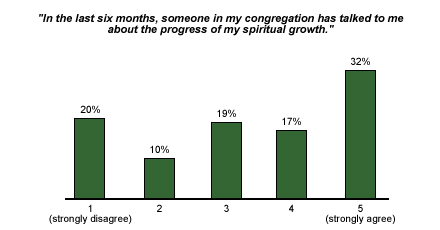This is the 11th in a series of columns exploring the 12 survey items that best measure congregational engagement.
The item, "In the last six months, someone in my congregation has talked to me about the progress of my spiritual growth" measures one of the most critical areas of managing a congregation: accountability. People are not being held accountable for their spiritual growth -- Gallup research* indicates that only 32% of members strongly agree that in the last six months someone in their congregation has talked to them about the progress of their spiritual growth. In fact, none of the other 12 items received a lower percentage of "strongly agree" responses than this one. To put it another way, nearly seven out of 10 members of faith communities are not getting the feedback they need about their spiritual growth.

Just as members need to know the expectations of membership in a faith community (see Related Items), they also need to know how they are progressing in meeting those expectations -- particularly in the area of spiritual growth.
Congregations are often woefully inadequate when it comes to providing feedback to members about their progress. In many cases, new members attend a class at which the "meaning of membership" is discussed, but expectations are seldom clarified. After members complete the class, the only expectations that many congregations even hint at are attendance and financial giving. Members have no way to check their progress regarding spiritual growth because those kinds of expectations have never been clarified. So they go without such criteria, or make up their own -- which may or may not be in line with anybody else's. The result: nobody is on the same page, so it is no wonder that many congregations have a hard time defining their mission.
Key Points for Spiritual Leaders
- Are your expectations clear? Clear expectations lay the foundation for everything your faith community is called to do and be, and they are also critical to accountability. How can members be held accountable to vague and assumed expectations? Without clear expectations, members will drift and possibly even leave the congregation.
- How much feedback are your members getting? All members need feedback to renew their sense of purpose and let them know how far they have come in their spiritual journey. As the spiritual leader of your congregation, it is your job to help them see the signs of progress. With larger congregations, it may not be possible to personally give feedback to every member. But you can be influential in insisting that the systems and processes are in place so that all members receive regular feedback from someone. Both lay and staff leaders need to be able to give feedback on the progress of those they lead.
- How can you show your people how far they have come? There are many techniques for giving feedback. Your leaders will have to find the style that fits them best. However, you can model a feedback process with your staff and key lay leaders, demonstrating a system that they can use with members. Here are a few simple methods that everyone can use:
- Set up regular meetings to discuss progress. Impromptu feedback is certainly valuable, but the process has more power if it is structured. Ask members how often they would like to meet (once a month, once a quarter, etc.) and then work out a structure that can be followed at each session.
- Record each person's success. Every time you or one of your leaders sees someone doing something particularly praiseworthy, write them a congratulatory note. Obviously, congratulating members verbally is also a good thing to do, but taking time to record your observation in writing carries even more weight.
- Ask your people to track their own learning. The most powerful thing you can do is to give members a way to record their progress in their spiritual journeys. A good way to begin is by defining what you mean by spiritual growth (see Related Items), so members can own the process and check their progress as they grow.
The SE25 are protected by copyright of The Gallup Organization, Princeton, NJ, 2001.
*Results are based on telephone interviews with 729 adult members of a church, synagogue, or other religious faith community, aged 18 and older, conducted October through November 2001. For results based on this sample, one can say with 95% confidence that the margin of sampling error is ±3.6%.
